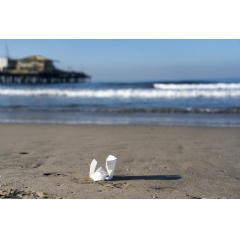CA AG Investigation into Fossil Fuel Industry a Turning Point in Fight Against Ocean Plastic Pollution

California Attorney General Rob Bonta announced a sweeping investigation into the fossil fuel and petrochemical industry’s role in the plastic pollution crisis. The announcement comes six months ahead of a planned ballot initiative supported by Ocean Conservancy and other leading environmental organizations that would drastically reduce single-use plastic packaging and food ware across the state. If the initiative, called the California Plastic Pollution Reduction and Recycling Act, passes in November, the Attorney General’s office would be responsible for defending any legal challenges to it as well as positioned to enforce the mandate and litigate violations. Dr. Anja Brandon, U.S. Plastics Policy Analyst at Ocean Conservancy, released the following statement:
“At every level of government in California we are seeing ambitious action against the threat of single-use plastics. The Attorney General’s announcement is an unmistakable signal to the fossil fuel and petrochemical industries that there will be no turning back on this issue: they will be held accountable. From our lungs and bloodstreams to our beautiful coastlines and ocean, the scourge of plastic pollution knows no bounds, and it’s time plastics makers help clean up the mess.”
ADDITIONAL BACKGROUND:
- 99% of plastics are made of fossil fuels. For more facts on the connection between plastics and climate change, see this fact sheet. For additional, peer-reviewed information on plastics and plastic pollution, check out these fact sheets.
- Analysis of 35 years of data from Ocean Conservancy’s International Coastal Cleanup highlight a recyclability crisis, particularly when it comes to the way we eat:
- Nearly 70% of the most commonly collected items over the last 35 years of the International Coastal Cleanup are effectively unrecyclable.
- Of these, approximately half are food and beverage related items like food wrappers, straws and stirrers, and takeout containers.
About Ocean Conservancy’s Trash Free Seas Program
Ocean Conservancy has led the fight for a clean, healthy ocean free of trash since 1986, when the U.S.-based nonprofit launched its annual International Coastal Cleanup (ICC). Since then, Ocean Conservancy has mobilized millions of ICC volunteers to remove trash from beaches and waterways around the world while pioneering upstream solutions to the growing ocean plastics crisis. Ocean Conservancy invests in cutting-edge scientific research, implements on-the-ground projects, and works with conservationists, scientists, governments, the private sector and members of the public to change the plastics paradigm. To learn more about our Trash Free Seas® program visit oceanconservancy.org/trashfreeseas, and follow Ocean Conservancy on Facebook, Twitter and Instagram.
( Press Release Image: https://photos.webwire.com/prmedia/7/288526/288526-1.jpg )
WebWireID288526
This news content was configured by WebWire editorial staff. Linking is permitted.
News Release Distribution and Press Release Distribution Services Provided by WebWire.